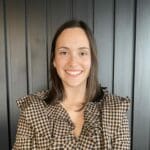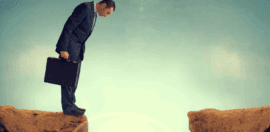Sowing the seeds for others to grow

20 October 2022 at 12:26 pm
Anthea Smits is an impact investor, social entrepreneur and CEO of The Difference incubator, an organisation that identifies, strengthens and grows social enterprise. She is this week’s Changemaker.
Anthea Smits didn’t opt for a traditional career route. Skipping university, she instead took up an early career in sales and worked at the Walt Disney Company for a decade, developing an acute understanding of customer engagement and brand identity.
Despite such a strong corporate skillset, Smits’ natural curiosity and faith stirred an interest to explore social change. She travelled to Southeast Asia, which cemented her strong belief in justice, inclusion and fairness, and ultimately left the sector to lead Urbanlife, a not-for-profit innovative church focused on community development and building social enterprise in response to local issues.
In 2015, Smits joined The Difference incubator, which provides business modelling and social impact consulting to create meaningful change, and became CEO three years later. She also sits on the board of the 2h project, a development organisation in Cambodia that runs micro-finance and social enterprise development programs.
In this week’s Changemaker, Smits explains the importance of making room for others and why she sees The Wizard of Oz’s Dorothy as the ultimate example of leadership.
What does a typical day look like for you?
There’s no such thing as a typical day. I am a little bit different to a traditional CEO. A day can span from coaching an entrepreneur in rural PNG, to speaking to the government, to working alongside our team on a project, to trying to convince philanthropy to do something, to actually running a business.
I get a bit of pressure from my board and my team at different times when they need me to do more of the CEO thing. Every now and again, they will say, we need you to be a CEO and be the face and get out of rural PNG. But I love our work, I love what we do and I will never fully get out of rural PNG or wherever it is that we are, because that’s where the work is happening. That’s where it’s at.
What do you value as a leader?
I remember someone was describing me once and just paid me this beautiful compliment. They said, I know how to sit in a village with people but I could probably also hold court with the queen. I think as good leaders, we need to be able to span across that level of diversity and how we’re able to relate and connect with people.
It’s interesting because I’m in the latter stage of my life, I turned 50 during COVID, and I think what I value as a leader has changed over the course of my life. Today, I see leadership as a role of service. My role is to make room for others.
One of my leadership heroes is Dorothy from The Wizard of Oz. I love her story because no one expected her to be a leader because she’s a woman. She had this incredible innocence and vulnerability, and yet strength and courage all at the same time.
She had this vision of where she was going, and she invited three quite needy characters along that journey. She makes room for those people and creates a community where she walks alongside them, and in that process, she helps them become more fully themselves. And most importantly, at the end of the day, she exposes the power.
I remind myself to be more like Dorothy. How am I making room for others? How am I staying in a place of vulnerability, but also strength and courage? How am I working to hold power to account?
What is your proudest career achievement?
What I’m proudest of currently is what I’m able to help others create. There’s a technical piece to that, so looking at questions like, what are we building? How do we build that? How do we test that? But it’s also often about helping someone find inner-courage or that special thing that is in them to create.
In terms of a particular moment, a couple of years ago, I had the privilege of co-facilitating a business exchange between 10 Papua New Guinean business women and 10 First Nations Australian business women. All the businesses represented were related to creative industries, cultural tourism or bush foods. They spent a week in Port Moresby together and a week in Cairns, just before COVID. The program was called Laikim Sister and the idea was to share what was possible.
We designed the whole thing around storytelling, and there weren’t just stories about their businesses, but of their culture and growing up and their families. There was this sense that they had more in common than what was different.
Personally, for the first time, I felt this moment where I wasn’t the facilitator anymore in that program. The group began to facilitate themselves and I felt personally embraced by them. As a facilitator, you have to let go of power for that to happen, and you have to have confidence that it will work out. It was euphoric. It felt as if my compass had been reset, I learnt so much.
What are some of the challenges facing the social sector?
The most common challenges that the entrepreneurs or non-profit leaders we work with face are connected to self-limiting beliefs.
The challenge we usually get called in to help fix is technical, like building something, which is generally pretty straightforward to help someone navigate. The bigger challenge usually shows up as we’re unpacking that, in what’s going on in people’s heads. It’s often around the stories that people believe or they have been telling themselves, and it limits their capacity to trust themselves.
So in the last four or five years, we’ve built our practice not just around the technical response, but around what we’re calling an inner-development journey as well. Both of these will happen simultaneously, so as someone begins to take a new action, this positive reinforcement should happen along with it.
What drives you?
People, ideas and the opportunity to problem solve.
How do you relax after work?
Bingeing on Netflix or whatever streaming service. I’m currently loving House of the Dragon. I’m always reading something, and I love going on long walks with my cute little cavoodle, Kevin.
What do you want your legacy to look like?
During COVID I turned 50 and there was this moment of realisation that I’ve probably got 10 to 15 years of active contribution left. I began to contemplate what I wanted that work to look like, and how I would like it to live beyond.
At TDI, we have this question at the centre of our work which is, ‘what is the role of business and finance in addressing structural inequality?’. I’d like my legacy to look like a contribution to that question, but also teaching others to do the same. Making room for lots of people to have voice and agency in their own journey is really important. Otherwise, if it’s me in the front row continually, that’s not going to leave a legacy.
There’s a quote that has been really helpful for me, which is along the lines of ‘when I was young, I wanted to change the world, but now that I’m older, I’m just content in changing myself’. I’ve really genuinely tried to live that because I know that if I am turning up as a better person, whoever is around me is going to have a better experience. The best I can do is actually be responsible for how I’m turning up and what I need to shift in my own thinking.







